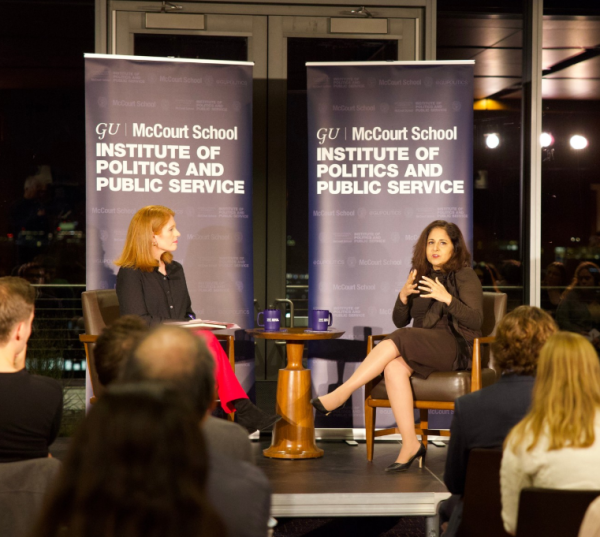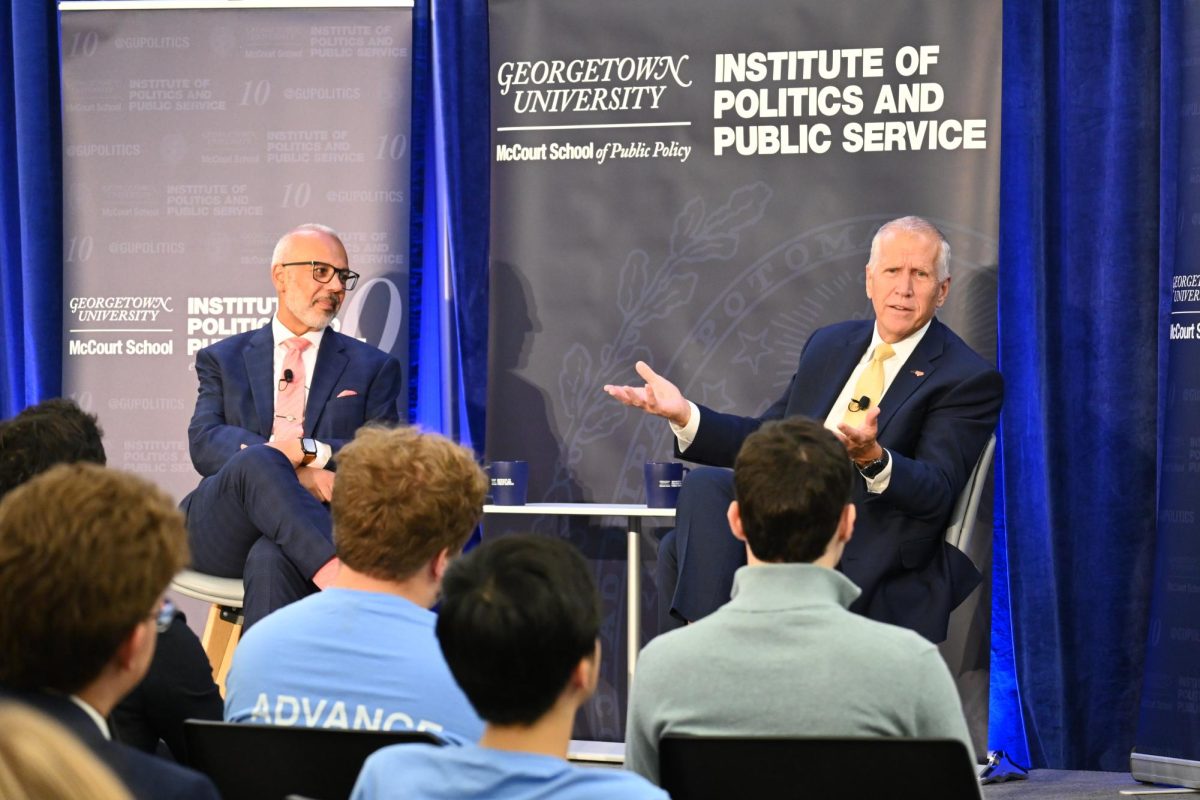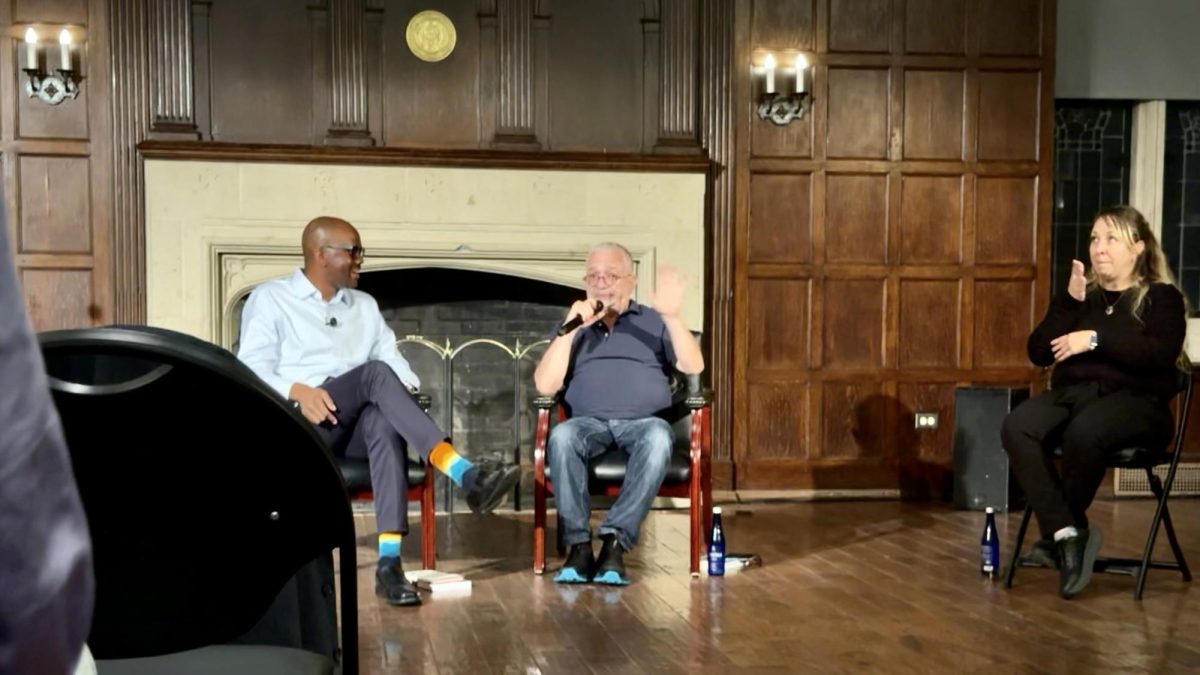Neera Tanden, director of the Domestic Policy Council, the principal forum on domestic policy, analyzed the political legacy of President Joe Biden’s administration and speculated on the future of the Republican and Democratic parties over the next four years at a Nov. 19 event.
Tanden, who previously served as Biden’s senior advisor for health care policy and helped draft the Affordable Care Act (ACA) under President Barack Obama, highlighted the key health care policies of the Biden administration as well as the gap between voter sentiments and objective reality. ABC News White House Correspondent Karen Travers (COL ’00, GRD ’03) moderated the discussion, which was organized by the Georgetown University Institute of Politics and Public Service (GU Politics).
Tanden said future generations should recognize the Biden administration’s progress in health care accessibility.
“More people had health insurance than at any time in our history under President Biden,” Tanden said at the event. “That is a profound legacy. The President won really hard-fought gains on ensuring that we’re lowering prescription drug costs or insulin, Medicare being able to negotiate the price of drugs limits on the seniors.”
While in office, President Biden signed the American Rescue Plan Act (ARP) and the Inflation Reduction Act (IRA), which together directed Medicare to negotiate prices for certain drugs for the first time. The IRA also capped monthly cost sharing for insulin at $35 and removed cost sharing for vaccines covered by Medicare. Other initiatives to cap out-of-pocket costs, however, are only scheduled to take effect under President-elect Donald Trump’s administration.
Tanden said it is important to pay attention to what message voters in the recent 2024 presidential election are sending.
“What did people really vote for in this election?” Tanden said. “Do they want to repeal? Do they want to come back to certain issues, and how successful will that be?”
Tanden said Trump’s victory, which was considered unexpected by many media outlets and pollsters, might be related to a delay in how voters understand an administration’s policies.
“It is maybe the case that sometimes people need to really think through the loss of something before you can really think through the benefit,” Tanden said. “I do think an irony of this administration will be that a lot of good things will look like they came in under President Trump. And you know, that’s an unfortunate aspect from my perspective.”

Tanden said Trump’s recent cabinet appointments, which have prompted pushback from both parties, will exacerbate partisanship and political inefficiency.
“I fundamentally think that they should realize that if it’s always that the rules are for one party only, then at some point, that party will also let go,” Tanden said. “I think that would be a mistake. We should have a normal standard to believe in the core mission of the agency you’re interested in running.”
Tanden said the current political climate is more polarized than when she first entered politics.
“I know that politics feels really fraught because when I got into Washington, it was like, ‘How much are you going to fund this bill or not?’ Today it’s like existential threats about who we are as a country,” Tanden said.
“We are having existential conversations of who the country is for and whether it’s for all of us or some of us,” Tanden added. “They’re going to have big policy changes and I think the question is, ‘Did this whole coalition that elected Trump want change or did they want all of Trump’s policies?’”
Tanden said miscommunication of policy, like Trump’s mass deportation plans, poses a threat to voter power.
“Mass deportation of 11 million Americans feels very different from mass deportation of criminals,” Tanden said. “Actually communicating to people what their government is doing is as vital in this moment as it is in any moment in our time and requires people who understand policy and who can make that connection to people’s lived experiences. People don’t identify the positive things in their life with what the federal government does.”
Tanden also said that, despite economic growth in the United States and Europe, voters are becoming more anti-incumbent.
“I think fundamentally the greatest question about the United States and really the Western world today is why we are in a period of the greatest material success and the greatest opposition to institutions,” Tanden said.


















